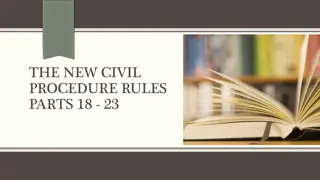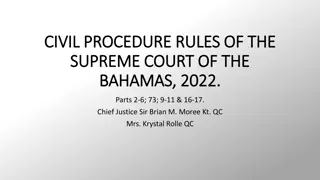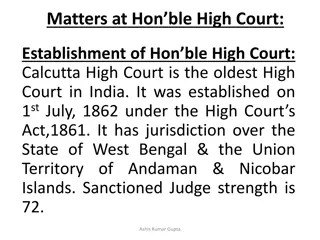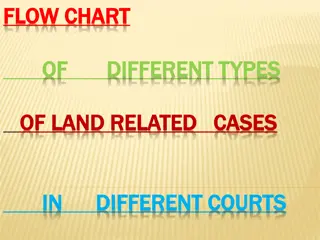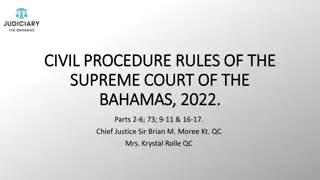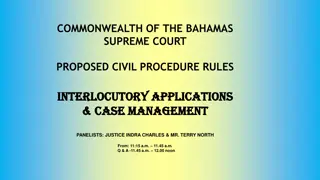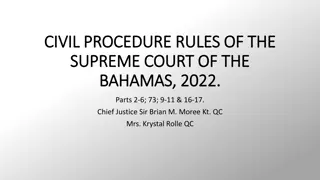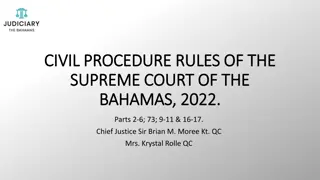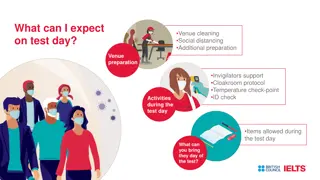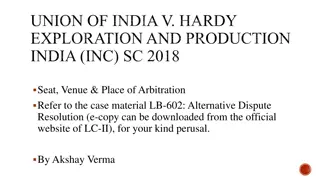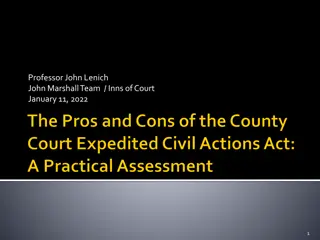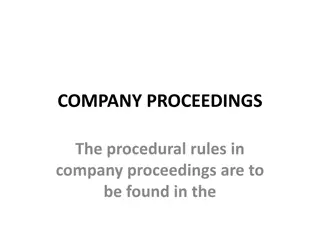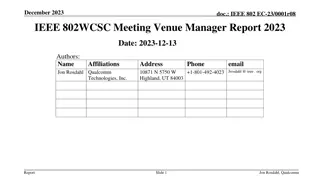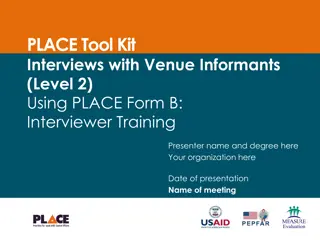Civil Venue Rules in Federal Court
This content discusses the rules for determining venue in civil actions in federal court, including requirements for defendant residency, events giving rise to the claim, property location, and corporate residency. Relevant case law and sections of the law, such as Sec. 1391 and Uffner v. La Reunion Francaise, are highlighted to provide clarity on venue selection.
Download Presentation

Please find below an Image/Link to download the presentation.
The content on the website is provided AS IS for your information and personal use only. It may not be sold, licensed, or shared on other websites without obtaining consent from the author.If you encounter any issues during the download, it is possible that the publisher has removed the file from their server.
You are allowed to download the files provided on this website for personal or commercial use, subject to the condition that they are used lawfully. All files are the property of their respective owners.
The content on the website is provided AS IS for your information and personal use only. It may not be sold, licensed, or shared on other websites without obtaining consent from the author.
E N D
Presentation Transcript
Sec. 1391. - Venue generally (b) Venue in general.--A civil action may be brought in-- (1) a judicial district in which any defendant resides, if all defendants are residents of the State in which the district is located; (2) a judicial district in which a substantial part of the events or omissions giving rise to the claim occurred, or a substantial part of property that is the subject of the action is situated;
8thCir. defendant must be responsible for the event/omission in district and it has to be an element of the cause of action
(c) Residency.--For all venue purposes-- (1) a natural person, including an alien lawfully admitted for permanent residence in the United States, shall be deemed to reside in the judicial district in which that person is domiciled;
1391(c)(3) a defendant not resident in the United States may be sued in any judicial district, and the joinder of such a defendant shall be disregarded in determining where the action may be brought with respect to other defendants.
Residence of corporations and unincorporated associations: 1391(c)(2) an entity with the capacity to sue and be sued in its common name under applicable law, whether or not incorporated, shall be deemed to reside, if a defendant, in any judicial district in which such defendant is subject to the court's personal jurisdiction with respect to the civil action in question
(d) Residency of corporations in States with multiple districts.--For purposes of venue under this chapter, in a State which has more than one judicial district and in which a defendant that is a corporation is subject to personal jurisdiction at the time an action is commenced, such corporation shall be deemed to reside in any district in that State within which its contacts would be sufficient to subject it to personal jurisdiction if that district were a separate State, and, if there is no such district, the corporation shall be deemed to reside in the district within which it has the most significant contacts.
1391(b)(3) if there is no district in which an action may otherwise be brought as provided in this section, any judicial district in which any defendant is subject to the court's personal jurisdiction with respect to such action.
28 U.S.C. 1406. CURE OR WAIVER OF DEFECTS (a) The district court of a district in which is filed a case laying venue in the wrong division or district shall dismiss, or if it be in the interest of justice, transfer such case to any district or division in which it could have been brought.
transfer from a district with venue to a more convenient one with venue
28 U.S.C. 1404. CHANGE OF VENUE (a) For the convenience of parties and witnesses, in the interest of justice, a district court may transfer any civil action to any other district or division where it might have been brought or to any district or division to which all parties have consented.
dismissal from a district with venue so that it can be brought outside of the United States
MACMUNN v. ELI LILLY CO. 559 F. Supp. 2d 58 (D.D.C. 2008)
As to the second showing, the statute calls on the court to weigh a number of case-specific private and public-interest factors. The private-interest considerations include: (1) the plaintiff s choice of forum, unless the balance of convenience is strongly in favor of the defendants; (2) the defendant s choice of forum; (3) whether the claim arose elsewhere; (4) the convenience of the parties; (5) the convenience of the witnesses; and (6) the ease of access to sources of proof. The public-interest considerations include: (1) the transferee s familiarity with the governing laws; (2) the relative congestion of the calendars of the potential transferee and transferor courts; and (3) the local interest in deciding local controversies at home.
shouldnt the transfer lead to dismissal on statute of limitations grounds?
PIPER AIRCRAFT CO. v. REYNO 454 U.S. 235 (1981)
Rule 10. Rule 10. Form of Pleadings Form of Pleadings Caption; Names of Parties. Every pleading must have a caption with the court s name, a title, a file number, and a Rule 7(a) designation. The title of the complaint must name all the parties; the title of other pleadings, after naming the first party on each side, may refer generally to other parties.
- Rule 8. General Rules of Pleading (a) Claim for Relief. A pleading that states a claim for relief must contain: (1) a short and plain statement of the grounds for the court s jurisdiction, unless the court already has jurisdiction and the claim needs no new jurisdictional support; (2) a short and plain statement of the claim showing that the pleader is entitled to relief; and (3) a demand for the relief sought, which may include relief in the alternative or different types of relief.
Rule 10(b) Paragraphs; Separate Statements. A party must state its claims or defenses in numbered paragraphs, each limited as far as practicable to a single set of circumstances. A later pleading may refer by number to a paragraph in an earlier pleading. If doing so would promote clarity, each claim founded on a separate transaction or occurrence and each defense other than a denial must be stated in a separate count or defense.
what purpose does service of a complaint on the defendant serve?
what purpose does the answer to a complaint serve?
what role might the complaint with answer play in: discovery? trial?
how might a defendant point to what is in a complaint to weed out an action that should not proceed to discovery/trial?
wrong forum failure to state a claim frivolousness inadequate evidentiary support
how do the Federal Rules limit frivolous actions?
Rule 11 discovery summary judgment
is there any way to dismiss on the basis of inadequate evidentiary support at the pleading stage?
1) common law pleading/equity pleading 2) reform through Field Code - called fact or code pleading
code pleading no conclusory allegations - ultimate facts (no evidence or conclusions of law)






